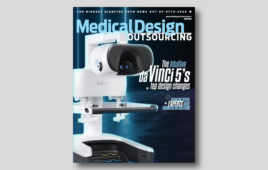In this issue:
2 HERE’S WHAT WE SEE:
20 MANUFACTURING & MACHINING
30 ENGINEERING 911
36 Hot medtech startups: 10 companies to watch in 2017
Why you should feel optimistic about 2017
Uncertainty continues to swirl around the new Trump administration, but there is a lot to be excited about in the medical device industry these days, especially when it comes to cardiology and diabetes treatment.
Medtech companies are performing well. More than 80% of the world’s 100 largest medical device companies saw their stock values increase during the first quarter of 2017 – about half enjoyed double-digit percentage increases.
The industry also continues to see major M&A deals. Becton Dickinson announced last month that it will acquire C. R. Bard in a $24 billion deal. Medtronic agreed to sell parts of its hospital supply business to Cardinal Health for $6.1 billion. And Abbott closed its $25 billion buyout of St. Jude Medical.
Important advances in cardiology
Recent months have seen a slew of major advances in treating heart disease:
• A customizable robotic heart sleeve demonstrated advantages over other cardiac assist devices such as VADs. The soft robot, developed by Harvard University and Boston Children’s Hospital, never contacts blood, reducing the risk of blood clots.
• Prevencio published new data showing that its Hart CAD test can accurately diagnose heart disease in just 2 hours. The test was able to detect coronary obstructions about 90% of the time.
• Researchers at the University of Alabama and University of Minnesota turned to 3D printing to grow heart cells onto a 1-micron-resolution scaffold. The tissue could synchronously beat and improved heart function in an animal model.
• Johns Hopkins researchers successfully grew mature heart muscle cells by implanting human stems cells into newborn rats.
The race to create an artificial pancreas
A stand-alone artificial pancreas appears closer than ever, with Medtronic leading the race. Last fall, its MiniMed 670G hybrid closed-loop system won FDA approval. Although not a stand-alone artificial pancreas, it marked an important step toward the development of a fully automated closed-loop system. Other companies aren’t far behind:
• Bigfoot Biomedical is developing its artificial pancreas with the help of Bryan Mazlish, a former quantitative finance guru who used his knowledge of algorithms to create a homebrew “bionic pancreas” for his wife and son.
• Tandem Diabetes is working with TypeZero and Dexcom to integrate an artificial pancreas algorhythm and CGM into its t:slim insulin pump.
• Insulet has been touting data from the first feasibility study of its the Omnipod Horizon hybrid closed-loop system.
 • Beta Bionics is using technology licensed from Boston University to develop its iLet bionic pancreas.
• Beta Bionics is using technology licensed from Boston University to develop its iLet bionic pancreas.
• French biotech Defymed’s Mailpan bio-artificial pancreas contains insulin-secreting cells meant to restore normal insulin production.
Granted, there are a lot of things that could go wrong for the medical device industry – especially when it comes to a major U.S. government misstep. But there are many things going well.
There is hope that two major chronic conditions – heart disease and diabetes – will soon be much more manageable.




